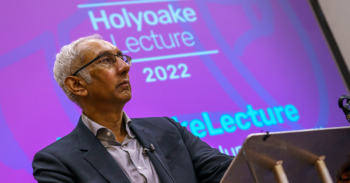Over 150 people joined Humanists UK at the Friends Meeting House, Manchester, on 16 November, to hear author, columnist, and Humanists UK patron Kenan Malik deliver Humanists UK’s prestigious annual Holyoake Lecture. Towards Humanist Politics: The Struggle to Transcend Race, was the first in-person Holyoake Lecture since 2019.
 Malik traced the intellectual history of ‘race’ to the Age of Enlightenment, and of European expansion. He identified how a collision between notions of ‘all men born equal’ and the inequalities perpetuated by colonialism and industrialised society gave rise to a new kind of thinking about human beings. A belief in racial ‘types and differences’, he said,’ was used to give false justification to… pre-existing inequalities’. Race, then, explained away the reality of social differences and helped to normalise them, ‘giving them the status of permanence’. This emerging belief that human beings were intrinsically, racially distinct in relation to their natures and their needs struck at the heart of the Enlightenment project, running counter to popular new ideas about the universal equality, dignity, and worth of every human being.
Malik traced the intellectual history of ‘race’ to the Age of Enlightenment, and of European expansion. He identified how a collision between notions of ‘all men born equal’ and the inequalities perpetuated by colonialism and industrialised society gave rise to a new kind of thinking about human beings. A belief in racial ‘types and differences’, he said,’ was used to give false justification to… pre-existing inequalities’. Race, then, explained away the reality of social differences and helped to normalise them, ‘giving them the status of permanence’. This emerging belief that human beings were intrinsically, racially distinct in relation to their natures and their needs struck at the heart of the Enlightenment project, running counter to popular new ideas about the universal equality, dignity, and worth of every human being.
The use of racial narratives to explain away this screeching dissonance was readily apparent in biographies of intellectual figures such as John Stuart Mill (1806-1873). The English philosopher and MP is an example of someone who outlined an explicit commitment against ethnic prejudices, yet offered justifications for colonial expansion through racist caricatures of ‘childish’ or ‘barbarian’ people overseas. This narrative portrayed European powers as benevolent forces, rather than violent invaders. At the same time, Malik also pointed to other figures of the ‘radical Enlightenment’ who saw that contradiction for what it was, and went further in putting their universalist (or humanist) views into practice. Diderot (1713-1784), D’Holbach (1723-1789), and Spinoza (1632-1677) all challenged the cruelties of the colonial project and its dehumanising treatment of non-Europeans.
But the effect of racial thinking went further than colonialism, said Malik, and led to new rhetoric about the working class in European societies, too. This subset of the population was in effect treated as racially distinct. ‘Class divisions were in reality, race divisions’, said Malik. In the 20th century, racial thinking became further saturated, as racial stereotypes were reclaimed and repurposed for liberation politics by movements such as négritude or the Black Panthers. A growing abundance of racial thinking contributed to the politics of ‘identity’ and ‘difference’ becoming the dominant political frame for much of the late 20th century.
Identity politics, he said, had supplanted solidarity, commonality, and universalism as ways of thinking about social problems. ‘To transcend race, to break the bounds of identity politics, requires us to resurrect that sense of radical universalism not just as an idea, but also as a social movement,’ said Malik, bringing his talk to a close, and to the rapturous applause of his audience.
Following a thoughtful question and answer session, Malik was awarded Humanists UK’s prestigious Holyoake Lecture medal for his work championing universalist, humanist values through his writing on race, class, and social issues – bringing valuable historically literate insights to some of today’s most salient debates.
Notes:
Further reading: Humanists UK interview with Kenan Malik. Malik’s upcoming book, Not So Black and White, will expand on many of the themes in his Holyoake Lecture in January 2023.
The Holyoake Lecture is held annually, and explores aspects of politics or a contemporary social or political issue, especially as it relates to secularist and humanist issues, including liberalism, democracy, social justice, feminism, anti-racism, LGBT rights, or equality. It is just one of the many events in the Humanists UK Annual Lecture series, which also includes the Darwin Day, Rosalind Franklin, Blackham, and Voltaire Lectures.
